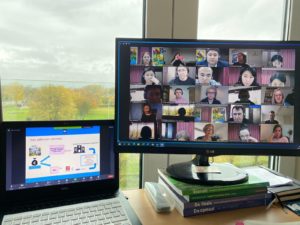 On 30-31 October, AFEW International in the framework of the PITCH project organized a semi-virtual study tour Amsterdam-Saint-Petersburg-Bishkek for municipal authorities, health officials and key population representatives from Russia and Kyrgyzstan, who are interested to learn about the partnership between the national and municipal authorities, institutes and NGOs.
On 30-31 October, AFEW International in the framework of the PITCH project organized a semi-virtual study tour Amsterdam-Saint-Petersburg-Bishkek for municipal authorities, health officials and key population representatives from Russia and Kyrgyzstan, who are interested to learn about the partnership between the national and municipal authorities, institutes and NGOs.
Originally, the tour was planned to take place in person in Amsterdam, but due to the COVID-19 pandemic this was no longer possible. AFEW International managed to organize a semi-virtual event where participants from Saint-Petersburg and Bishkek still could come together in their own cities and presentations from the Netherlands were followed online.
The topic of this study tour was “Municipal social contracting”, which is a system of municipal funding of HIV/AIDS services delivered by civil society organisations for the most vulnerable populations. Both cities – Saint Petersburg and Bishkek – are trying to establish the system of municipal social contracting in the field of HIV prevention and harm reduction. The authorities would be contracting NGOs for delivering these essential services and partner in some areas like testing and monitoring.
Through 4 online sessions, participants visited the Dutch Ministry of Health, Netherlands Institute for Public Health and the Environment, 2 sex worker organizations, the Amsterdam Municipal Health Service (GGD) and an organization working with drug users. With these visits AFEW International wanted to give the participants an overview of the Dutch perspective on how the government works together with non-governmental (health) institutions in providing health care to vulnerable groups.
Marcel de Kort, strategic health policy coordinator from Dutch Ministry of Health (MoH), and Silke David, Senior policy advisor at Netherlands Institute for Public Health and the Environment (RIVM), kicked off the semi-virtual meeting by telling how HIV and sexual health policies are translated into programs for clients. They touched upon Dutch pragmatism and the bottom-up approach in the national HIV response. Silke told about the integral approach with between the MoH and RIVM and how the RIVM contracts NGOs to collect data and do outreach work.
Jane Ayal, public health nurse at P&G292, an organization that aims to improve the emancipation and self-reliance of sex workers in the Netherlands, touched upon their health services for clients, field work and cooperation with the Dutch Municipal Health Service. Since 2000, sex work is legalized in the Netherlands which has decreased the barrier of sex workers to seek help. Most sex workers are registered and in close contact with the CSOs contracted by the municipality. P&G292 finds the biggest challenge to reach those sex workers, who due to fear or other reasons are not registered.
Dana Lomnasan is a social worker at Spot46, an organisation based in The Hague. Spot46 is an information, knowledge and network centre that provides legal and health support to sex workers. She told guests about their cooperation with other organisations in the Netherlands and The Hague municipality, by whom they are partially subsidized. They have a drop-in centre, but also conduct field work. One of their aims is to reduce stigma around sex work in Dutch society.
Three speakers from the Amsterdam Municipal Health Service told guests about the work they do and their role in the COVID-19 response. There was also a presentation about the Amsterdam municipality HIV response and research on PrEP. The Amsterdam Municipal Health Service explained that they among others focus on those people that are difficult to find. By working together with municipality and NGOs, the Amsterdam Municipal Health Service identifies the gaps in prevention and care at city level and addresses that accordingly.
In the last session AFEW International welcomed Sara Woods, Policy maker at Mainline, who told participants on Saturday morning about the history of the organisation and their work in the field of harm reduction. Not only do they do outreach work in several cities in the Netherlands, they also monitor the drug scene and give trainings to professionals who work with drug users. They work together with the Amsterdam municipality and the Ministry of Health. Sara told guests about the groups that are more difficult to reach such as those who practice chemsex and who use drugs behind closed doors.
The knowledge and experience learnt about the partnership between the national and municipal authorities, institutes and NGOs, participants of the study tour will use in their everyday work in Russia and Kyrgyzstan.
For reference
Starting from January 2019, AFEW International implemented the project St. Petersburg and Bishkek – Key Populations and HIV & TB Prevention Priorities, funded through Aidsfonds under PITCH.
PITCH is a strategic partnership between Aidsfonds and the Frontline AIDS (former International HIV/AIDS Alliance) working with those most affected by HIV: adolescent girls and young women, msm, people who use drugs, prisoners and sex workers. The program aims to enable these groups to transform (inter)national HIV responses by strengthening their advocacy skills and capacities and promoting the innovative evidence-informed practice.
Within this project, AFEW and partners work with NGOs and municipalities in St. Petersburg and Bishkek on geographically focused HIV responses. 2020 is the final year of the PITCH project implementation.















